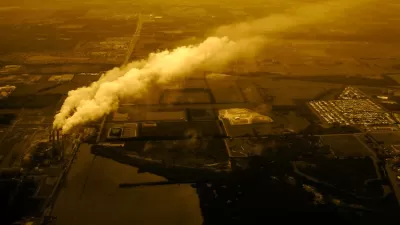A federal evaluation of fuel-efficiency standards says that while drastic climate change is imminent, there is little reason to do anything about it.

In August, an environmental impact statement from the National Highway Traffic Safety Administration noted that the planet would experience a seven-degree temperature increase by the end of the century. However, it did not describe the consequences of this level of climate change:
A rise of seven degrees Fahrenheit, or about four degrees Celsius, compared with preindustrial levels would be catastrophic, according to scientists. Many coral reefs would dissolve in increasingly acidic oceans. Parts of Manhattan and Miami would be underwater without costly coastal defenses. Extreme heat waves would routinely smother large parts of the globe.
Instead, the statement argued that a massive and infeasible shift away from fossil fuels would need to occur to avoid this temperature increase. The Trump administration says that its proposed freeze on fuel-efficiency standards will not have a substantial effect on global warming.
Critics have pointed out the problems with suggesting that fuel standards be rolled back because their impact would be minimal:
Using the no-action scenario "is a textbook example of how to lie with statistics," said MIT Sloan School of Management professor John Sterman. "First, the administration proposes vehicle efficiency policies that would do almost nothing [to fight climate change]. Then [the administration] makes their impact seem even smaller by comparing their proposals to what would happen if the entire world does nothing."
Environmental advocacy groups, scientists, and public officials in the United States and from around the world continue to push for policies and actions they say will address climate change.
FULL STORY: Trump administration sees a 7-degree rise in global temperatures by 2100

Planetizen Federal Action Tracker
A weekly monitor of how Trump’s orders and actions are impacting planners and planning in America.

San Francisco's School District Spent $105M To Build Affordable Housing for Teachers — And That's Just the Beginning
SFUSD joins a growing list of school districts using their land holdings to address housing affordability challenges faced by their own employees.

The Tiny, Adorable $7,000 Car Turning Japan Onto EVs
The single seat Mibot charges from a regular plug as quickly as an iPad, and is about half the price of an average EV.

Seattle's Plan for Adopting Driverless Cars
Equity, safety, accessibility and affordability are front of mind as the city prepares for robotaxis and other autonomous vehicles.

As Trump Phases Out FEMA, Is It Time to Flee the Floodplains?
With less federal funding available for disaster relief efforts, the need to relocate at-risk communities is more urgent than ever.

With Protected Lanes, 460% More People Commute by Bike
For those needing more ammo, more data proving what we already knew is here.
Urban Design for Planners 1: Software Tools
This six-course series explores essential urban design concepts using open source software and equips planners with the tools they need to participate fully in the urban design process.
Planning for Universal Design
Learn the tools for implementing Universal Design in planning regulations.
Smith Gee Studio
City of Charlotte
City of Camden Redevelopment Agency
City of Astoria
Transportation Research & Education Center (TREC) at Portland State University
US High Speed Rail Association
City of Camden Redevelopment Agency
Municipality of Princeton (NJ)




























